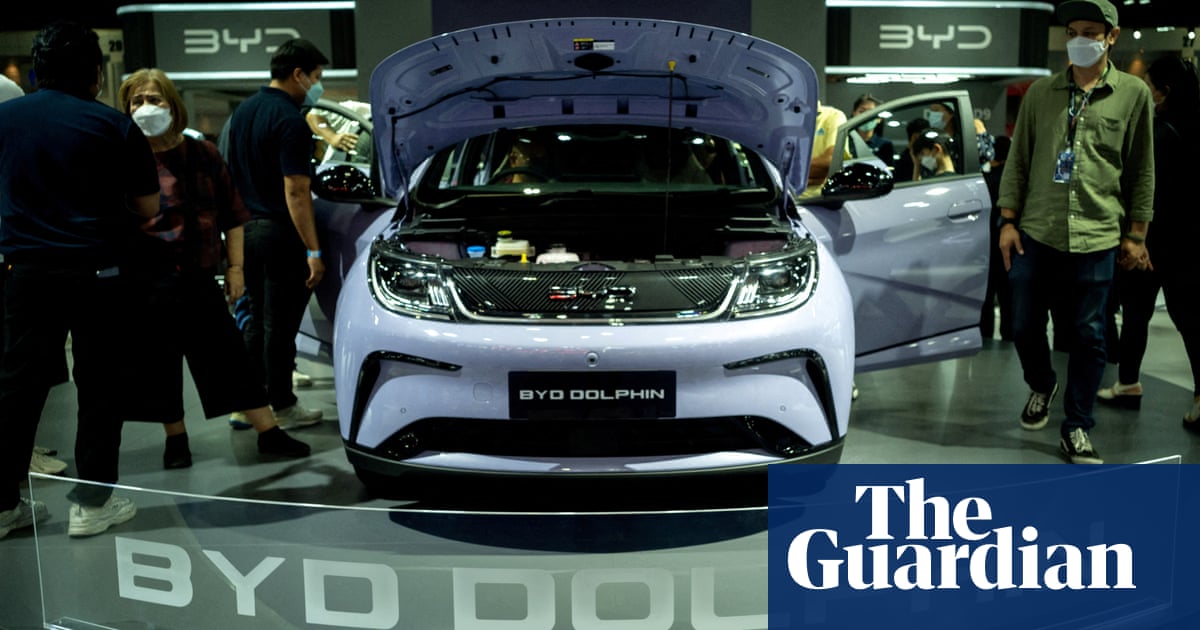
The launch of a new electric car this week in Queensland could start a price battle among other manufacturers and make the technology accessible to a wider audience.
But market experts warn that Australia still needs better policies to ensure the competition takes hold and more consumer education about the ultimate price – and price savings – of the new vehicles.
-
Sign up for Guardian Australia’s free morning and afternoonemail newsletters for your daily news roundup
BYD’s latest launch, called the Dolphin, set for Thursday on the Gold Coast, triggered speculation after the company promised it would deliver “the most affordable, high-quality EV launched in Australia”.
While predictions about its local cost have raged, the car is expected to undercut the $43,990 offered by other Chinese brands, MG and GWM.
The Electric Vehicle Council’s chief executive, Behyad Jafari, says the promise highlights growing downward pressure on next-generation car technology – pressure likely to intensify given the federal government’s commitment to introduce a fuel-efficiency standard.
“Whether it’s this car or another, we are seeing electric vehicle prices fall,” he says. “It won’t be long before we see electric vehicles in the $30,000 price ranges, and we saw sales pick up pretty quickly when $40,000 electric vehicles became available.”
The prices are a long way from four years ago, he says, when “the most popular electric vehicle cost around $120,000”.
Four battery-powered cars are now available in Australia with a price tag under $50,000, even though the most popular electric vehicle in the country, the Tesla Model Y, costs $68,900.
Splend’s chief executive, Chris King, whose company procures EVs for rideshare subscriptions, says falling costs are overdue in Australia.
“They’ve started with the more premium segment and they’re moving down to more cost-effective segments as production costs come down and they reach scale,” he says.
“We’ve seen [cheaper EVs] in London for more than three years now and they’re the same kind of cars that we’ll see in Australia.”
King says a “sharp price point” for the BYD Dolphin could set the tone for the market and inspire competition.
“Over the next 12 months, I think we’ll start to see the likes of Volkswagen here ... and there’s some really good products coming out from Kia and Hyundai,” he says.
after newsletter promotion
The Australian Electric Vehicle Association’s national president, Dr Chris Jones, says there are still questions about whether BYD’s Dolphin will be the first electric car to break the $40,000 barrier. Its New Zealand pricing is equivalent to $45,000.
“Any car price that starts with a three will be hot news,” Jones says. “If the driveway price is under $40,000 that will be a real breakthrough.”
Vehicle sales data from the Federal Chamber of Automotive Industries shows China became the fourth largest source of new cars in Australia last year, narrowing the lead from Japan, Thailand and South Korea.
“The Chinese manufacturers have volume on their side,” Jones says. “The vast majority of products they make get sold locally into the Chinese market and that’s enormous so they’ve got numbers to make low-margin vehicles viable.”
Australia may not see all the vehicles offered in China, he says, including the $16,000 BYD Seagull.
Jafari says consumers should be encouraged to consider the total cost of owning a car.
“We’re used to thinking about buying cars purely in terms of the upfront price because all petrol costs were largely the same,” he says. “With an electric car, you’re actually going to make savings back of more than $2,000 a year, every year, from lower fuel and maintenance costs.
“That does make a pretty big difference.”
"electric" - Google News
June 18, 2023 at 09:31AM
https://ift.tt/HFUY70K
Hopes launch of new electric car could spark price war in Australia - The Guardian
"electric" - Google News
https://ift.tt/OXoAZam
https://ift.tt/M5B76t3
Bagikan Berita Ini














0 Response to "Hopes launch of new electric car could spark price war in Australia - The Guardian"
Post a Comment